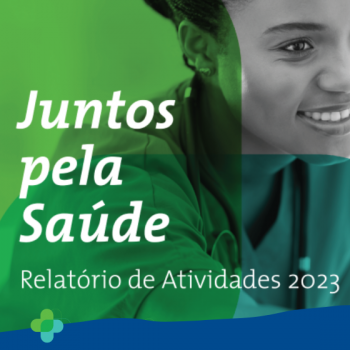
Together for Health: Annual Activity Report 2023
The document details the actions developed during the first year of the Program, ensuring transparency for society and partners. Launched in 2023, ...
Read moreWelcome to Juntos Pela Saúde | EN
Implementation period: September 2023 to October 2026
Presentation and description:
The Social Protection Health Cycle contributes to strengthening Primary Care in the Brazilian Unified Health System (SUS). The project expands its capacity for diagnosis, planning, managing, monitoring and evaluation of services through the Shared Work Plans (Planos de Trabalho Compartilhados, in Portuguese) with public management, guided by the health needs of local populations.
The project aims to support public management in:
– Improving municipal programs and policies;
– Providing training for the Primary Care teams;
– Enhancing work processes through the encouragement of educational health practices;
– Providing improvements in the physical conditions (furnishing and equipment) of health units.
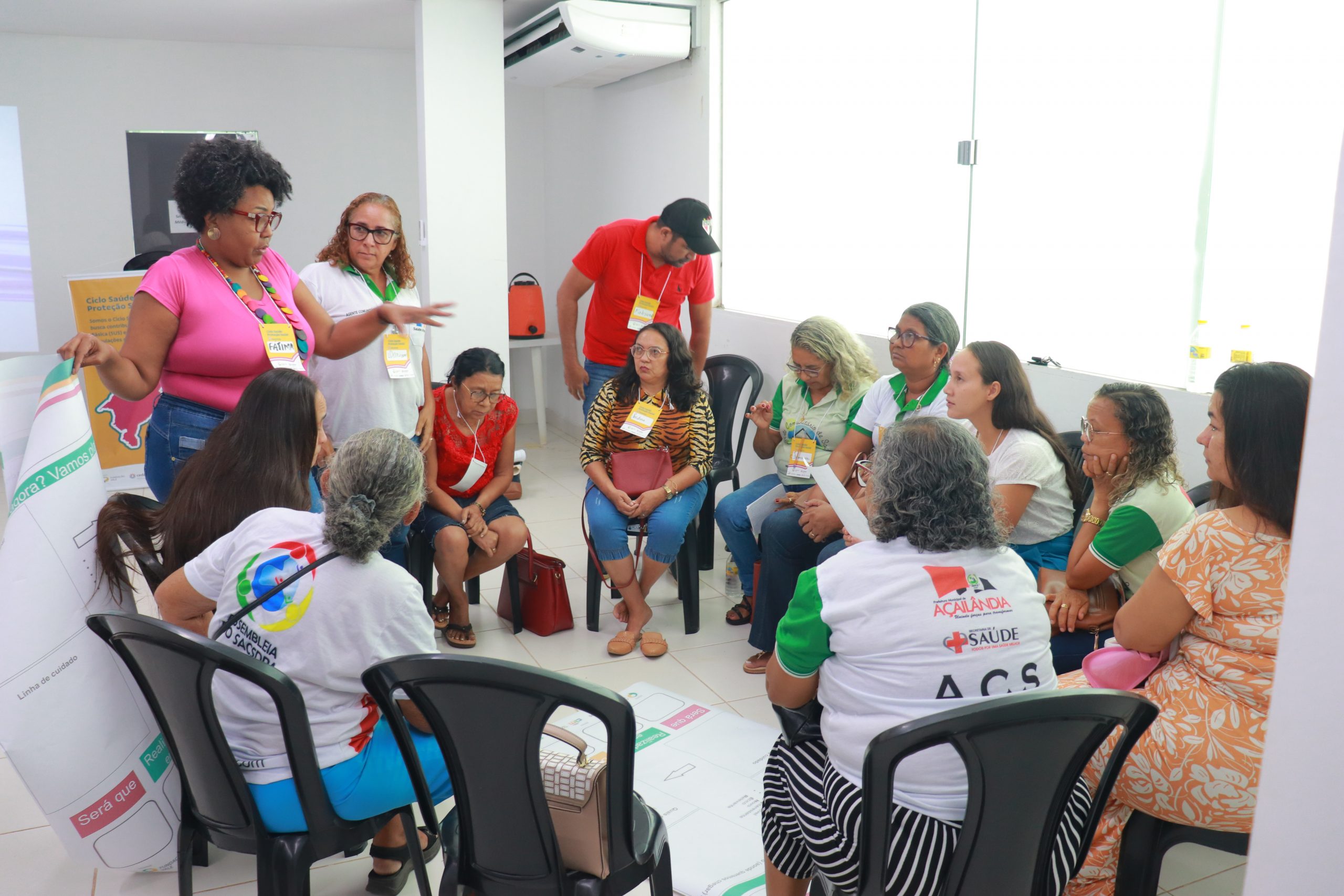
Social Protection Health Cycle workshop in Açailândia, Maranhão.
The project is divided in six lines of activity:
1. Diagnosis/Updates and Partnerships: This involves formalising partnerships and updating the frameworks used for monitoring, evaluation, and the development of Shared Work Plans with public management.
2. Equipment: Donation of equipment and furniture to improve the infrastructure of the Basic Health Units (UBS) and to support essential services such as the Social Assistance Reference Centers (CRAS) and the Unified Social Assistance System (SUAS). The aim is to expand public access to healthcare services and address inequalities.
3. Permanent Education for the Health Promotion: Delivery of educational initiatives targeting local managers and healthcare professionals, aimed at strengthening their capacity to develop improved public policies and practices. This component also prioritises reducing disparities in healthcare outcomes.
4. Health Planning – Territory and Indicators: Development of management skills based on indicators, tracking of the territories (digital and printed) and technological tools to enhance data-driven decision-making.
5. Health Communication: Implementation of outreach campaigns aimed at engaging patients, supporting local professionals, maintaining a virtual learning platform, producing instructional materials, and promoting project activities.
6. Monitoring and Evaluation: Ongoing monitoring of project implementation and assessment of outcomes. This includes the creation of Power BI dashboards to enable partners to track programme results.
“The Social Protection Health Cycle is an intensive program that tackles training and effective action. The adopted methodology seeks to expand and strengthen existing knowledge, as well as promoting practices based on the dialogue with users of the Basic Health Units and the Social Assistance Reference Centers. Alongside the participants we conduct an assessment of local challenges and resources, fostering the creation of local action plans that can contribute to improving monitored indicators in addition to achieving individual and collective results for health promotion in the municipalities”, said Katia Edmundo, executive director of Centro de Promoção da Saúde (CEDAPS).
Beneficiary description:
The initiative benefits eight municipalities in Pará, covering 111 Basic Health Units (UBS) and 21 Social Assistance Reference Centers (CRAS), and 24 municipalities in Maranhão, covering 396 UBS and 55 CRAS. In both states, the program assists 100% of the population of the Basic Health Units and the local partnerships involved.
Municipalities served:
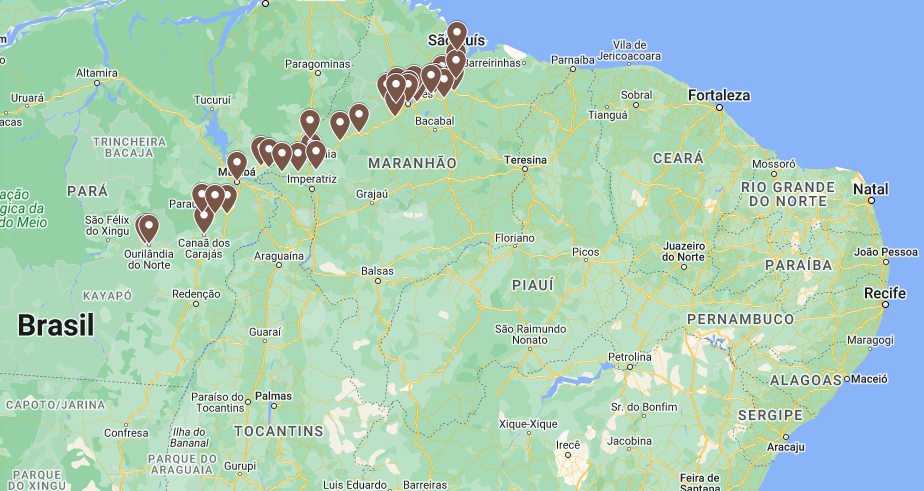
Pará: Bom Jesus do Tocantins, Canaã dos Carajás, Curionópolis, Eldorado dos Carajás, Marabá, Ourilândia do Norte, Parauapebas, Tucumã.
Maranhão: Açailândia, Alto Alegre do Pindaré, Anajatuba, Arari, Bacabeira, Bom Jardim, Bom Jesus das Selvas, Buriticupu, Cidelândia, Igarapé do Meio, Itapecuru Mirim, Itinga do Maranhão, Miranda do Norte, Monção, Pindaré Mirim, Santa Inês, Santa Luzia, Santa Rita, São Francisco do Brejão, São Luís, São Pedro da Água Branca, Tufilândia, Vila Nova dos Martírios, Vitória do Mearim.
To access the interactive map with all the municipalities supported by the Together for Health program, click here.
The project is supported by Together for Health, a BNDES initiative, in partnership with private donors, with the goal of gathering resources to expand access to public healthcare for the population in the North and Northeast regions of Brazil.
Executor:
 CEDAPS – Centro de Promoção da Saúde (or Health Promotion Center) is a civil society organization created in 1993 which aims to develop communities’ ability to actively participate in their own problem-solving process. They also contribute to the improvement of local public services in order to promote health from the perspective of addressing their social determinants and reducing social inequalities.
CEDAPS – Centro de Promoção da Saúde (or Health Promotion Center) is a civil society organization created in 1993 which aims to develop communities’ ability to actively participate in their own problem-solving process. They also contribute to the improvement of local public services in order to promote health from the perspective of addressing their social determinants and reducing social inequalities.
Supporters:
 The National Bank of Economic and Social Development (BNDES) is a federal public company linked to the Ministry of Development, Industry, Trade and Services. It is the Federal Government’s main instrument for long-term financing and investment in all segments of the Brazilian economy, with the aim of improving the lives of generations, promoting economic, social and environmental development. It operates throughout the country, from its office in Rio de Janeiro (RJ), where its activities are concentrated, with official headquarters in Brasília (DF) and regional offices in São Paulo (SP) and Recife (PE).
The National Bank of Economic and Social Development (BNDES) is a federal public company linked to the Ministry of Development, Industry, Trade and Services. It is the Federal Government’s main instrument for long-term financing and investment in all segments of the Brazilian economy, with the aim of improving the lives of generations, promoting economic, social and environmental development. It operates throughout the country, from its office in Rio de Janeiro (RJ), where its activities are concentrated, with official headquarters in Brasília (DF) and regional offices in São Paulo (SP) and Recife (PE).
 The Vale Foundation has a major purpose in social development. In a collaborative way, they identify needs and enhance opportunities to strengthen public policies and contribute to the promotion of structuring social transformations in the territories in which Vale operates. Currently, it is present in Espírito Santo, Maranhão, Minas Gerais, Pará and Rio de Janeiro.
The Vale Foundation has a major purpose in social development. In a collaborative way, they identify needs and enhance opportunities to strengthen public policies and contribute to the promotion of structuring social transformations in the territories in which Vale operates. Currently, it is present in Espírito Santo, Maranhão, Minas Gerais, Pará and Rio de Janeiro.
![]() Wheaton is the world’s premier precious metals streaming company with the highest-quality portfolio of long-life, low-cost assets. Its business model offers investors leverage to commodity prices and exploration upside but with a much lower risk profile than a traditional mining company. As a result, Wheaton has consistently outperformed gold and silver, as well as other mining investments, creating sustainable value through streaming.
Wheaton is the world’s premier precious metals streaming company with the highest-quality portfolio of long-life, low-cost assets. Its business model offers investors leverage to commodity prices and exploration upside but with a much lower risk profile than a traditional mining company. As a result, Wheaton has consistently outperformed gold and silver, as well as other mining investments, creating sustainable value through streaming.
Manager:
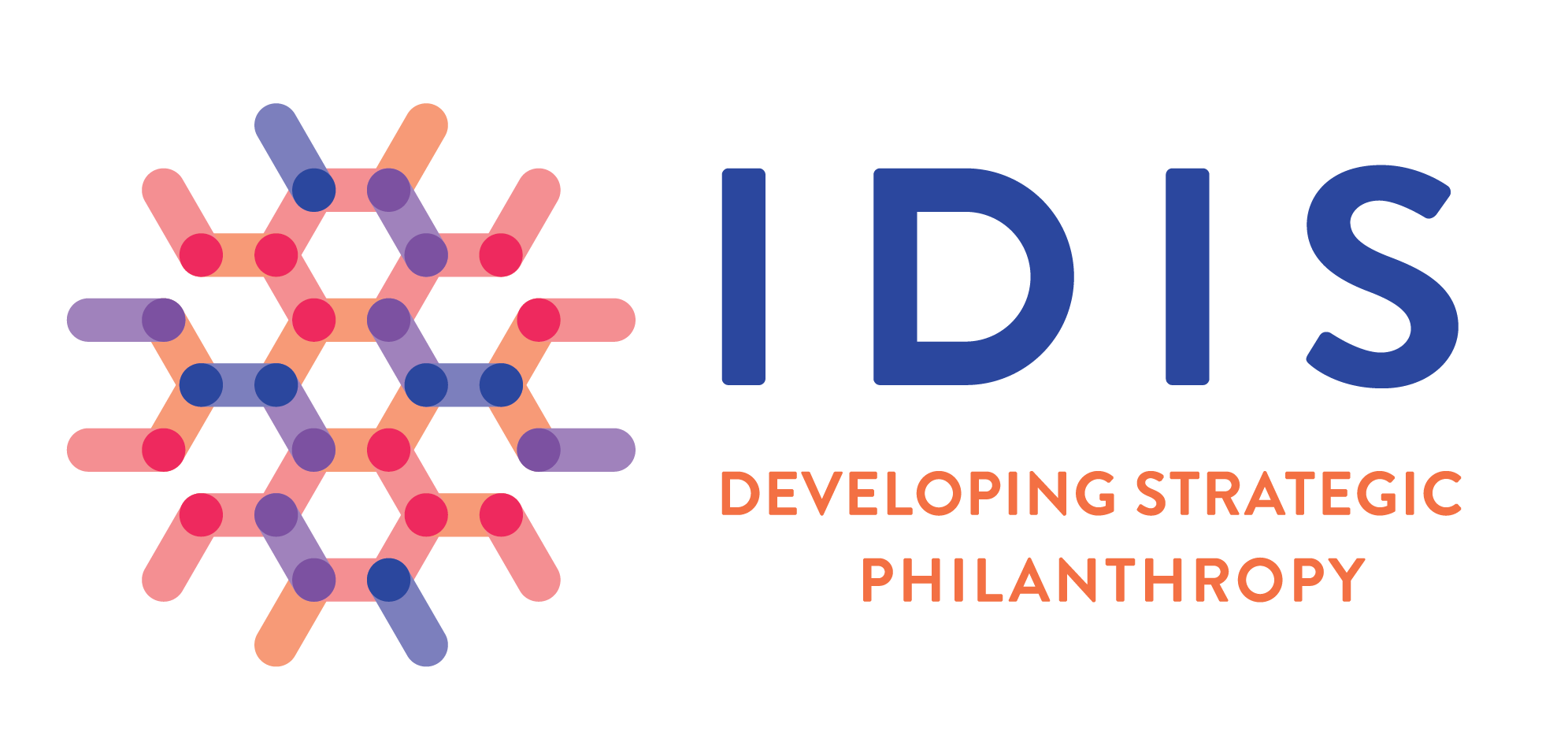
IDIS – Institute for the Development of Social Investment, is a civil society organization founded in 1999 and pioneer in technical support to social investors in Brazil. With the mission to inspire, support and promote strategic philanthropy and its impact, they serve individuals, families, companies, corporate and family run institutes and foundations, as well as with civil society organizations, in actions that transform realities and contribute for the reduction of social inequality in the country. Their actions are based on the tripod of generating knowledge, offering advisory and developing social impact projects that contribute to the strengthening of the ecosystem of strategic philanthropy and of giving culture.

The document details the actions developed during the first year of the Program, ensuring transparency for society and partners. Launched in 2023, ...
Read more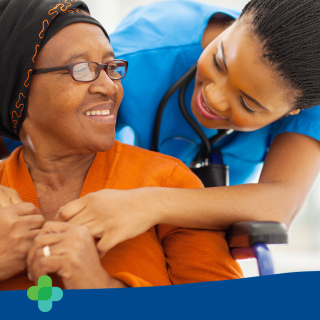
In 2023, the Juntos pela Saúde (Together for Health) Program was launched, a Brazilian Development Bank (BNDES) initiative managed by IDIS –Institu...
Read more
In a world that increasingly values collaboration and collective building as a value, models of financing that follow this logic are gaining more spac...
Read more
Between the 1st and 5th of May 2023, will occur the 4th edition of Catalysing Change Week (CCW). Considering the most significant global event led by...
Read more